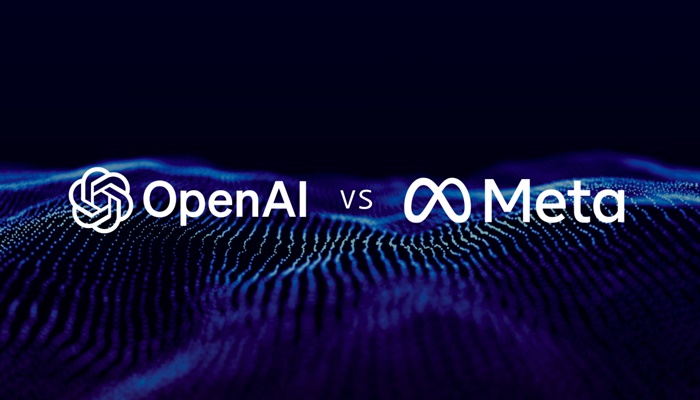In the fiercely competitive realm of Artificial Intelligence, the battle for top talent has escalated into an unprecedented “arms race,” with tech giants vying for the brightest minds in the field. Few sagas illustrate this more vividly than the intense recruitment skirmishes between OpenAI and Meta. This high-stakes talent war, characterized by audacious compensation offers and strategic counter-moves, offers invaluable lessons on the true drivers of retention and recruitment in a rapidly evolving technological landscape. Beyond the headlines of astronomical salaries, this conflict underscores the enduring importance of mission, culture, and long-term vision in attracting and retaining the human capital that will define the future of AI.
The Genesis of Conflict: Meta’s Aggressive Pursuit
The catalyst for this talent war can be traced to Meta’s strategic pivot and aggressive investment in AI. Following what some perceived as an underwhelming performance in its initial AI model development, Mark Zuckerberg’s Meta embarked on an ambitious campaign to supercharge its AI capabilities. This initiative saw the creation of a dedicated Superintelligence Labs and a significant financial commitment, reportedly investing between $14-15 billion in Scale AI alone, a company specializing in data labeling and AI infrastructure.
A cornerstone of Meta’s strategy was the direct recruitment of top-tier AI talent, particularly those from leading AI research organizations like OpenAI. This wasn’t merely about filling vacancies; it was a targeted, aggressive campaign to acquire the intellectual firepower necessary to compete at the forefront of AI innovation. The company successfully lured prominent names, including Alexandr Wang (though he is the CEO of Scale AI, a partner, not an OpenAI defector) and Nat Friedman (former GitHub CEO, an investor and advisor in AI, not directly a Meta hire from OpenAI). These prominent figures in the broader AI investment landscape, indicate Meta’s serious intent to align with top minds and technologies.
The intensity of this talent acquisition drive became public knowledge through reports of extraordinary compensation packages. Meta reportedly offered some OpenAI researchers compensation packages exceeding $100 million. While Meta has publicly disputed these specific figures, OpenAI CEO Sam Altman himself confirmed that ‘crazy’ offers were indeed being made, highlighting the extreme lengths companies were willing to go. Despite Meta’s denials of the exact numbers, the effectiveness of their recruitment efforts is undeniable: Meta successfully hired at least three Zurich-based OpenAI researchers and several others, totaling around eight known defections from OpenAI to Meta. These moves sent shockwaves through the AI community, signaling a new level of competition for human capital.
OpenAI’s Counter-Offensive: Mission Over Mercenaries
OpenAI’s reaction to Meta’s aggressive poaching was swift and visceral. Mark Chen, OpenAI’s Chief Research Officer, publicly expressed his visceral reaction to the talent drain. This wasn’t just about losing employees; it was perceived as an attack on the very core of OpenAI’s mission and its unique culture.
In response, OpenAI quickly recalibrated its compensation strategies, implementing creative retention programs, and actively making counter-offers to prevent further defections. This proactive approach aimed to demonstrate to its employees that their contributions were valued, not just financially, but also within the framework of the company’s ambitious goals.
Sam Altman, OpenAI’s CEO, took a more philosophical stance, publicly criticizing Meta’s mercenary tactics. He articulated a powerful counter-narrative, emphasizing OpenAI’s mission-oriented culture as its ultimate competitive advantage. Altman famously stated, “Missionaries will beat mercenaries”, implying that a deep-seated commitment to a shared purpose would ultimately prove more resilient than pure financial incentives. This statement encapsulated OpenAI’s belief that while money is important, it cannot fully compensate for a sense of purpose, impact, and belonging that a strong mission provides. For OpenAI, its goal of building artificial general intelligence (AGI) for the benefit of humanity serves as a powerful magnet for researchers who prioritize scientific advancement and societal impact over immediate financial gain.
How Employees Should Navigate the AI Gold Rush
The OpenAI–Meta AI talent war offers critical insights for employees navigating the booming AI job market.
Don’t Be Dazzled Solely by Money
While a nine-figure compensation package is undeniably attractive, the saga highlights that money alone does not guarantee long-term satisfaction or career fulfillment. Employees, especially those at the pinnacle of their fields, should critically evaluate several factors beyond the immediate financial offer.
Organizational Culture: Does the company’s culture align with your values? Is it collaborative, innovative, supportive, or highly competitive? A toxic culture, regardless of pay, can lead to burnout and dissatisfaction.
Long-Term Mission and Vision: Is the company’s overarching mission something you genuinely believe in and are passionate about? Working towards a purpose-driven goal can provide intrinsic motivation that far outweighs financial incentives in the long run.
Development Opportunities: Does the role offer opportunities for continuous learning, skill development, and career advancement? In a rapidly evolving field like AI, stagnation can be detrimental to a career. Top talent thrives on challenges and growth.
Impact and Autonomy: Will you have the autonomy to pursue innovative research or projects? Will your work genuinely contribute to the company’s goals and potentially to the broader field? The ability to make a significant impact is a powerful motivator for leading researchers.
Meta’s aggressive moves unequivocally demonstrate the immense demand for top AI talent. For skilled professionals in this domain, this period presents a unique opportunity to leverage their expertise. Knowing your market value, not just in terms of salary but also in terms of the strategic importance of your skills, allows you to negotiate for better compensation, more challenging roles, and greater autonomy. The fact that companies are willing to offer such extraordinary packages underscores that top AI researchers are not merely employees but strategic assets crucial to competitive advantage. This empowers employees to seek environments where their contributions are truly recognized and rewarded.
Beyond the Paycheck, What Should Employers Offer?
The talent war provides a huge learning for employers about effective recruitment and retention strategies in a hyper-competitive market.
Big Compensation Helps, But Culture and Mission Matter More
While Meta’s deep pockets undeniably attracted some talent, OpenAI’s robust response and Sam Altman’s commentary emphasize that compensation, while a powerful tool, is just one piece of the puzzle. A strong, purpose-driven culture and a compelling mission can act as powerful retention tools that even massive financial offers struggle to overcome. OpenAI’s success in retaining much of its talent, despite the allure of Meta’s offers, suggests that its “missionary” culture provides a unique value proposition that resonates deeply with its employees. For companies like Meta, traditionally known for their vast resources, the challenge may be to cultivate a sense of purpose and mission that can compete with the intrinsic motivation offered by organizations explicitly founded on ambitious, world-changing goals.
Proactive Retention is Essential
OpenAI’s swift recalibration of compensation and implementation of creative retention strategies serve as a textbook example of proactive talent management. In a market where poaching is rampant, waiting for employees to be tempted away is a losing strategy. Employers must continuously monitor market rates, understand their employees’ motivations beyond salary (e.g., work-life balance, project autonomy, career development), and be prepared to make competitive counter-offers or provide alternative incentives. Regularly reviewing compensation structures, offering tailored professional development, and fostering a supportive work environment are crucial for building loyalty and reducing vulnerability to external poaching.
Beware of Escalation
The AI talent arms race carries inherent risks, particularly the potential for unsustainable escalation. As The Economist points out, spending hundreds of millions on individual hires may be financially destabilizing in the long run. Such aggressive tactics can inflate salary expectations across the industry, making it difficult for even well-funded companies to maintain competitive compensation without straining their budgets. This can lead to a vicious cycle where companies are forced to prioritize short-term talent acquisition over long-term financial health and sustainable growth. Moreover, a culture built solely on outbidding competitors can foster a mercenary mindset among employees, leading to a lack of loyalty and a constant search for the next highest bidder, undermining team cohesion and long-term commitment.
Human Capital is at the Forefront of AI
The OpenAI–Meta AI talent war is more than just a corporate rivalry, it’s a microcosm of the broader AI talent arms race that is currently defining the technological landscape. This saga highlights the immense strategic importance of human capital in AI development. The ability to attract, retain, and motivate the world’s leading AI researchers and engineers is now a critical differentiator for companies vying for dominance in this transformative field.
Ultimately, this conflict underscores that while compensation plays a significant role, it is just one piece of a much larger puzzle. A purpose-driven culture, opportunities for employee growth and impact, and a clear, compelling mission remain vital for both recruitment and retention. In the race to build the future of AI, the companies that succeed will be those that not only invest heavily in technology but also deeply understand and nurture the human talent driving that innovation. The ‘missionaries’ may indeed have a long-term advantage over the ‘mercenaries’ in this new frontier.



















